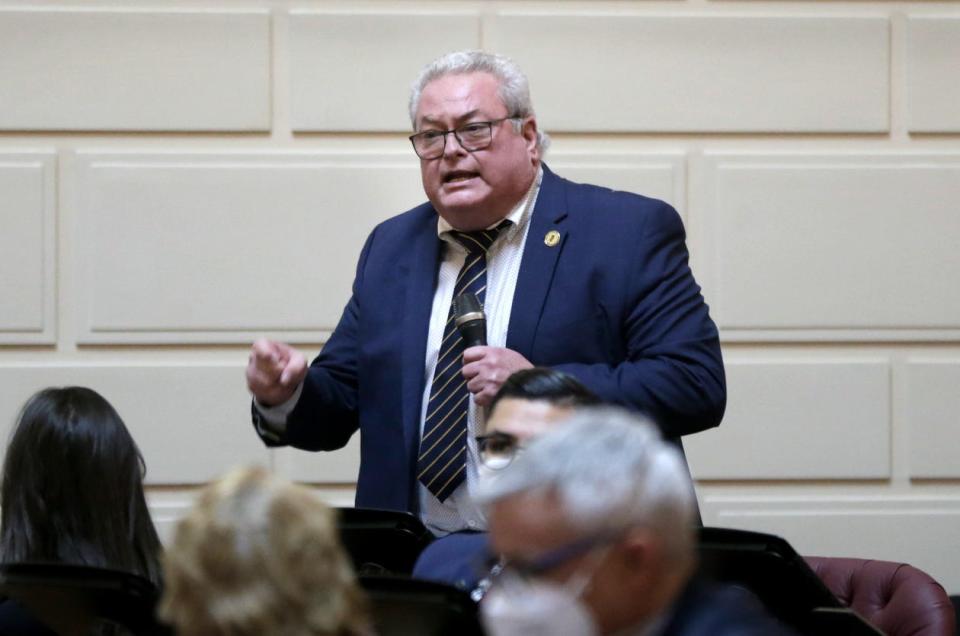Police, firefighters make opening pitch in battle to restore annual pension COLAs
PROVIDENCE – The push to reinstate annual pension boosts to Rhode Island's retired state and municipal workers, as well as public school teachers, has begun anew with a plea from lobbyists for two groups – police and firefighters – to get 2.5% compounded annual cost of living adjustments, or COLAs.
There was never any doubt that the bill sponsored by Providence public school teacher Rep. William O'Brien marked the opening shot on Tuesday in a renewed battle by public employees of all stripes to regain the annual COLAs that were pared back to once every four years as part of the 2011 pension overhaul shepherded to passage by then-state Treasurer Gina Raimondo.
The aim of that paring back: to save state taxpayers $274 million the first year and billions over the next 25 years.
And the hearing on O'Brien's bill – H 6203 – merely set the stage for two hours of hearings on other bills in the police and firefighters' package, including this year's version (H 5201) of a Raimondo-vetoed bill to guarantee tax free, two-thirds pay disability pensions to firefighters who have hypertension, heart conditions or a stroke.

More: COLAs could come earlier than expected for state pensions. Here's how.
Bill trying to bring back pre-2011 COLA increases
"We all know what happened," said Paul Valletta, lobbyist for the Rhode Island State Association of Fire Fighters. "Pensions were taken away from state workers, city workers, teachers, firefighters, police officers, and, remarkably, people that had already retired, which I think was the most egregious part of that."
"Everybody lost their COLA," said Valletta, equating the last of the "$400 to $500" pension increases that have been awarded at four-year intervals to "two trips to the grocery store."
"So what we're asking for, 12 years later, after those pension benefits were taken away from people, [is] for a COLA to come back for fire and police ... 2.5% compounded. We're just trying to go back to basically what we had prior to those [2011] changes."
"We too would like to return to a time where people who gave the best years of their lives in the police service can have somewhat of a meaningful COLA," echoed John Rossi, the lobbyist for the International Brotherhood of Police Officers.
"I understand the drastic times that took place back in 2008 ... 2010," he said. "That being said, I think also some political careers were made out of that 'reform' bill.
"And quite frankly, I believe at that time we were told that all we could expect [in pension-fund performance] any time in the near future was anemic return on the stock market," he said, alleging a falsehood.
Opponents cite impact on cities, towns, taxpayers
Rep. Patricia Morgan, who has built her own career outside the State House as a financial advisor, told Rossi he is missing the impending impact on cities and towns – aka on taxpayers – of recent events in the stock market.
"The stock market is down a lot in the last two years, and municipalities are going to have to come up with a larger annual required contribution. I just know these pension plans are suffering. Everybody's suffering.
"Have you any idea of what ... the annual required contribution ... is for your municipalities?" she asked.

Rossi did not. State Treasurer James Diossa's office informed lawmakers it has not been asked to provide a projected 20-year cost analysis of the proposed 2.5% COLA and cannot take a position on the bill without one.
The last COLA for most retirees was in 2021: 1.06% applied to the first $33,130 of their pension benefit if they retired before July 1, 2015, and to the first $27,608 if they retired more recently, for an average of $351.
The exception: retired municipal employees in communities with pension funds that are already 80% or more funded were slated to get 3.5% last year in their first $27,901 in benefits – or $977 – if they are newer retirees, and $33,482 ($1,172) if they are pre-2015 retirees.
Bill on making PTSD an 'on the job' injury for police and firefighters heard
As promised, Rep. Stephen Casey, a Woonsocket firefighter, stepped aside as chairman of the committee hearing the police and firefighters package so he could personally recount some of the horrors he and his colleagues endure on any given day.
"The goal of this is not to have people pensioned off for a post-traumatic stress injury," he said. "The goal of this legislation, for me, is to have the ability for a person to go and get treatment if they're not feeling that they can safely operate their machine, do their job, drive the fire truck, climb on a roof, rescue a baby – any of those things that we do on a regular basis.

"If you're not in the right mind and you can't concentrate on exactly what you're doing, you are either going to hurt yourself or you're going to hurt somebody else, one of your colleagues, and it's just not a safe way to operate."
"Picture yourself responding to a rescue call, finding an 18-year-old girl [who] hung herself by her belt in the closet. Her knees are bent and her feet are still on the floor – which means she could have just stood up to save herself – and having to assist the police in cutting the belt down and releasing her from the constraints."
"Or investigating a fire alarm in an apartment complex, finding an elderly man who lived alone decomposed, his remains liquefying into his couch ... or performing CPR on a 6-year-old boy on his kitchen floor with his mother and his siblings in the room.
"This isn't something that I read in a book on the coffee table. These are in my head. These are the things that I have experienced. This is my personal experience. These things affect all of us in every way," Casey said.
"A post-traumatic stress injury is probably not just one thing. It's a culmination. It's a compilation of all these things piled on top of each other, and it affects people in different ways."
Nationwide, he said, there were 96 line-of-duty deaths for firefighters in 2020 and 120 firefighters who died by suicide.
This article originally appeared on The Providence Journal: Pension COLAs for police, firefighters debated at RI State House

